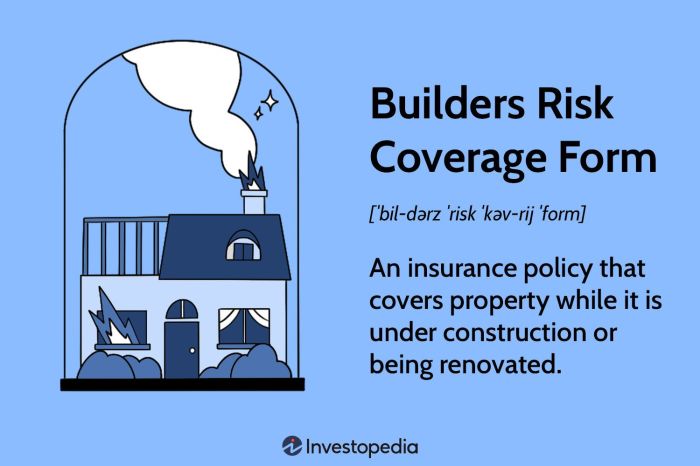The construction industry thrives on meticulous planning and execution, but unforeseen events can quickly derail even the most carefully crafted projects. From unexpected weather damage to workplace accidents, the potential for significant financial losses is ever-present. This is where builder’s insurance steps in, providing a crucial safety net for contractors and builders of all sizes. Understanding the nuances of different policy types and coverage areas is paramount to safeguarding your investment and ensuring the successful completion of your projects.
This guide delves into the multifaceted world of builder insurance, exploring the various policy options available, the key coverage areas they provide, and the factors influencing their cost. We will also navigate the claims process, the importance of choosing the right provider, and the legal considerations that must be addressed. By the end, you will possess a comprehensive understanding of how to secure the appropriate insurance coverage to protect your business and your projects.
Key Coverage Areas

Protecting your business as a builder requires a comprehensive insurance policy. Understanding the key coverage areas is vital for mitigating financial risks and ensuring the smooth operation of your construction projects. This section details the standard coverage components of a typical builder’s insurance policy and highlights potential gaps to be aware of.
Property Damage Coverage
This coverage protects your business from financial losses due to damage or destruction of your property, including buildings, equipment, and materials. This could encompass damage caused by fire, theft, vandalism, or natural disasters like storms or floods. For example, if a fire destroyed a building under construction, property damage coverage would help cover the cost of rebuilding. It’s crucial to ensure your policy adequately covers the full replacement value of your assets, considering inflation and potential increases in material costs. Underinsurance can leave you significantly exposed financially.
Liability Coverage
Liability insurance protects your business from claims of bodily injury or property damage caused by your operations. This is crucial, as accidents on construction sites are unfortunately common. For example, if a passerby is injured by falling debris from your construction site, liability insurance would cover medical expenses and potential legal costs. This coverage also extends to damage caused to neighboring properties during construction. The policy limit should be high enough to cover substantial claims, as the costs associated with liability lawsuits can quickly escalate.
Workers’ Compensation Coverage
Workers’ compensation insurance is legally mandated in most jurisdictions and protects your employees in the event of work-related injuries or illnesses. This coverage typically pays for medical expenses, lost wages, and rehabilitation costs. For instance, if a worker suffers a broken leg on a job site, workers’ compensation would cover their medical bills and lost income during their recovery period. Failing to have adequate workers’ compensation coverage can result in significant legal and financial penalties.
Potential Coverage Gaps
Builders should be aware of potential gaps in standard policies. For example, many policies have exclusions for certain types of damage, such as those caused by faulty workmanship. This means that if a structural problem arises due to a mistake made by your crew, you might not be covered. Similarly, professional liability insurance, often called errors and omissions (E&O) insurance, is usually a separate policy that protects against claims of negligence or mistakes in your professional services, such as design flaws. Addressing these gaps requires carefully reviewing your policy wording and considering supplemental coverage options to ensure comprehensive protection. Consulting with an insurance broker specializing in construction can help identify and address these potential gaps in coverage tailored to your specific business needs.
Legal and Regulatory Considerations

Builder’s insurance is subject to a complex web of legal and regulatory requirements that vary significantly depending on location. Understanding these regulations is crucial for builders to ensure compliance and avoid potential legal issues. Failure to comply can lead to significant financial penalties and reputational damage.
Legal requirements for builder’s insurance typically cover minimum coverage amounts, specific types of coverage required (such as liability and property damage), and the process for obtaining and maintaining insurance policies. These regulations are often set at the state or provincial level and can further be influenced by local ordinances or specific project requirements. For instance, some jurisdictions may mandate higher coverage limits for projects of a certain size or complexity, or require specific endorsements to cover environmental hazards.
Jurisdictional Variations in Builder’s Insurance Regulations
The specific legal requirements surrounding builder’s insurance differ considerably across jurisdictions. For example, the minimum coverage amounts for liability insurance might range from a few hundred thousand dollars in one state to several million in another. Similarly, the types of coverage mandated can vary; some jurisdictions might require specific endorsements for pollution or asbestos, while others might not. Builders must research and understand the specific regulations in their area of operation. Failure to do so can expose them to substantial liability.
Potential Legal Issues from Inadequate Insurance Coverage
Inadequate insurance coverage can lead to several severe legal problems. For instance, if a builder causes property damage during a construction project and lacks sufficient liability insurance, they could be held personally liable for the costs of repair or replacement, potentially leading to bankruptcy. Similarly, if a worker is injured on a construction site, and the builder’s workers’ compensation insurance is insufficient, the builder could face lawsuits and significant financial penalties. A lack of appropriate insurance can severely impact the builder’s personal assets and business viability.
Implications of Non-Compliance with Insurance Regulations
Non-compliance with builder’s insurance regulations carries various serious implications. These can include hefty fines imposed by regulatory bodies, suspension or revocation of licenses, and difficulty obtaining future insurance coverage. Furthermore, non-compliance can significantly damage a builder’s reputation, making it harder to secure new contracts and negatively affecting future business prospects. In severe cases, non-compliance can lead to criminal charges, particularly if the lack of insurance results in harm or injury. For example, a builder operating without the required liability insurance who causes significant damage could face criminal prosecution.
Ending Remarks

Navigating the complexities of builder’s insurance can seem daunting, but with careful planning and a thorough understanding of the available options, you can effectively mitigate risks and protect your construction business. Remember to meticulously review policy documents, compare providers, and address potential coverage gaps. By proactively addressing insurance needs, builders can confidently focus on delivering high-quality projects while safeguarding their financial well-being and reputation.
Question Bank
What is the difference between builder’s risk insurance and contractor’s insurance?
Builder’s risk insurance covers damage to the project itself during construction, while contractor’s insurance covers the contractor’s liability and potential damages caused by their work.
How long does a builder’s insurance policy typically last?
The duration varies depending on the project’s timeline, but it generally covers the construction period.
What types of documentation are typically required when filing a claim?
This includes photos of the damage, detailed descriptions of the incident, relevant contracts, and any other supporting evidence.
Can I get builder’s insurance for a small-scale renovation project?
Yes, many insurers offer policies for smaller projects, but coverage and costs will vary.
What happens if my insurance claim is denied?
You usually have the right to appeal the decision, providing additional information or evidence to support your claim.